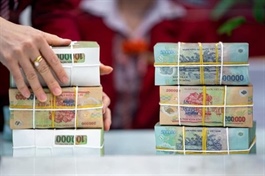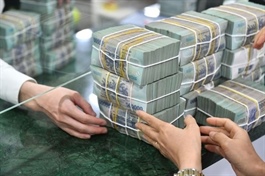Interest rate hike may not be suitable answer
Interest rate hike may not be suitable answer
Raising interest rates amid low credit growth will negatively impact the economy and are not the optimal solution for stabilising the current high exchange rate, economists have said.

According to the State Bank of Vietnam (SBV) statistics published in early July, the exchange rate has increased by approximately 5 per cent since the beginning of the year.
This rise is in line with regional trends and represents a moderate increase compared to some neighbouring currencies. However, it is still a significant rise compared to last year’s 2.6 per cent increase.
The current pressure on the exchange rate is due to a combination of factors. “High demand for the US dollar, slow credit growth, and some capital flow risks into Vietnam due to policy differences are fundamental reasons for this trend,” said Ngo Dang Khoa, head of Foreign Exchange, Capital Markets, and Securities Services at HSBC.
Meanwhile, Dr. Can Van Luc, chief economist at BIDV, said the exchange rate has increased significantly compared to the beginning of the year due to three reasons.
“Firstly, the US dollar has appreciated, with the DXY index up 4.1 per cent from the end of 2023. Secondly, the interest rate differential has narrowed compared to the beginning of the year but remains negative at around -1 to -1.5 per cent per year for overnight tenors. Thirdly, the demand for gold holdings remains high, and the issue of gold smuggling has not been thoroughly addressed, leading to increased US dollar demand.”
The rising exchange rate trend continues to adversely affect businesses that need to import raw materials such as machinery parts, steel, chemicals, and animal feed. Companies with debt payments in US dollars and those looking to expand production through foreign purchases are also directly impacted.
At the 2024 monetary policy implementation task conference, Dang Ngoc Hoa, chairman of the Board of Directors at Vietnam Airlines, said, “For every 1 per cent increase in the exchange rate, the company’s costs rise by $12.5 million. Thus, with the current exchange rate fluctuation of 4 per cent, calculated based on the free market rate, Vietnam Airlines will have to bear an additional cost of approximately $50 million this year.”
On a positive note, a weaker VND benefits export businesses, especially those in agriculture, seafood, and wood products. Companies with contracts paid in US dollars also gain an advantage. However, the impact and benefits vary significantly across businesses.
The SBV’s stabilisation measures continue to be a foundation for exchange rate stability by continuously withdrawing liquidity through treasury bills to reduce excess domestic currency VND in the system and selling foreign currency for immediate intervention since late April until now, with an estimated scale of about $4-6 billion.
VND deposit interest rates have shown a clear upward trend since the second half of April at most banks, especially at commercial banks, with a common total increase of 0.2-0.6 per cent per annum and even a sharp rise of 1-1.3 per cent per annum for 12-month terms at some commercial banks that previously had the lowest market rates such as ABBank, and MSB.
Currently, the listed 12-month deposit rates have generally increased to around 5-5.5 per cent per annum. Additionally, 6 per cent rates have emerged for longer terms of 15 months at HDBank and NamA Bank.
With the domestic currency devaluation since the beginning of the year and average inflation for the first six months at 4.08 per cent, close to the National Assembly’s target of 4-4.5 per cent for the whole year, analysts have suggested that the SBV may need to raise regulatory interest rates in the second half of the year. However, this is not the baseline scenario proposed by HSBC’s research team, said Khoa.
“We expect inflation to hover near the upper target but only temporarily before potentially falling below 4 per cent on-year in the third quarter. Thus, the pressure to raise rates due to inflation not being high,” he said.
Economic expert Le Xuan Nghia said, “The government, businesses, and the public are still calling for lower interest rates, so a move by the SBV to raise regulatory interest rates seems impossible.”
Moreover, Vietnam’s current credit growth remains modest. According to the SBV report covering the first half of the year, credit growth stood at a mere 2.4 per cent as of the end of May, despite achieving a 6 per cent growth by the end of June compared to 2023, meeting the higher targets set by the government. This discrepancy arose because a flurry of signed contracts led to pronounced disbursements in June.
Dao Minh Tu, Deputy Governor of the SBV, said, “Banks need to pay attention to sudden surges in credit and not pursue credit growth at all costs, but rather focus on quality.”
Khoa of HSBC added that raising interest rates amid low credit growth would negatively impact the economy and was not the optimal or sole solution for stabilising the exchange rate.
“Policymakers have been implementing other measures, such as issuing treasury bills and more flexible open market operations (OMO). Therefore, we expect the SBV to keep the policy rate steady at 4.5 per cent this year as a balancing act,” Khoa said.
The SBV’s monetary policy has shifted towards more caution as exchange rate pressures increase. Accordingly, the SBV has intervened with large-scale foreign currency sales, maintained treasury bill issuance in the open market, and adjusted various market rates, such as increasing the OMO rate by 50 basis points to 4.5 per cent per annum and treasury bill rates by 200 basis points to 4.5 per cent per annum.
Luc of BIDV added that the fiscal policy should play a leading role, focusing on targeted expansion and accelerating public investment disbursement to promote growth, ensure macroeconomic stability, and stabilise exchange rates while ensuring social welfare.
“There is also a need for a strong commitment to upgrading the stock market by 2025 and a focus on controlling systemic risks, particularly the interconnection between banks, securities, insurance, and real estate sectors,” said Luc.
“More decisive, consistent, and fundamental solutions are needed, such as ending the monopoly on gold bar production and import, amending Decree 24/2012, making gold transactions more transparent, and imposing stringent penalties for violations and smuggling to ensure growth and macroeconomic stability.”
Regarding the impact of gold on the current high exchange rate, domestic prices have cooled, and the gap between SJC and world gold prices has narrowed significantly.



























